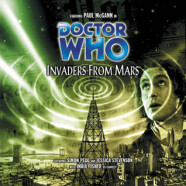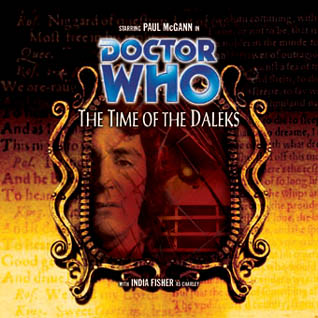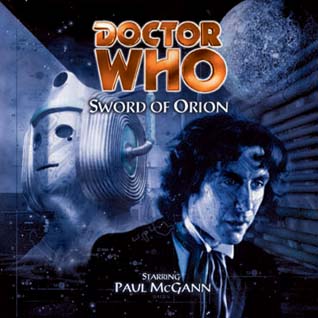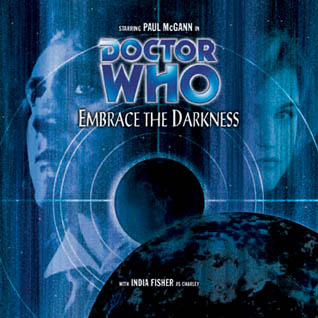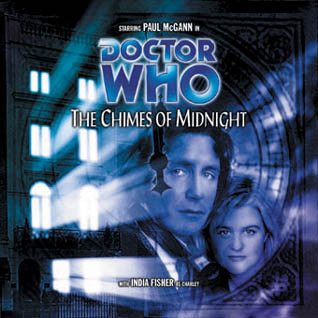Review – Big Finish Doctor Who #28: “Invaders From Mars”
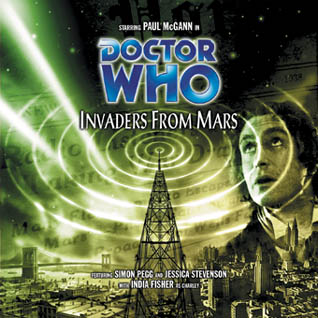
This is the next in line of my Big Finish Productions Doctor Who retro-reviews.
#28 – “Invaders From Marsâ€Â
From Big Finish’s site:
Hallowe’en 1938.
A year after a mysterious meteorite lit up the skies of New York state, Martian invaders laid waste to the nation. At least, according to soon-to-be infamous Orson Welles they did. But what if some of the panicked listeners to the legendary War of the Worlds broadcast weren’t just imagining things?
Attempting to deliver Charley to her rendezvous in Singapore 1930, the Doctor overshoots a little, arriving in Manhattan just in time to find a dead private detective. Indulging his gumshoe fantasies, the Doctor is soon embroiled in the hunt for a missing Russian scientist whilst Charley finds herself at the mercy of a very dubious Fifth Columnist.
With some genuinely out of this world ‘merchandise’ at stake, the TARDIS crew are forced into an alliance with a sultry dame called Glory Bee, Orson Welles himself and a mobster with half a nose known as ‘The Phantom’.
And slowly but surely, something is drawing plans against them. Just not very good ones…
Written By: Mark Gatiss
Directed By: Mark Gatiss
Cast
Paul McGann (The Doctor); India Fisher (Charley Pollard); Ian Hallard (Mouse / Winkler / Luigi / Heavy); Mark Benton (Ellis); Jonathan Rigby (John Houseman / Thug / Streath); David Benson (Orson Welles / Professor Stepashin / Halliday); Paul Putner (Bix Biro / Noriam / Man); Simon Pegg (Don Chaney / Actor); Jessica Stevenson (Glory Bee / Carla / Women); John Arthur (Cosmo Devine / Hotel Clerk); Katy Manning (Reception Guest); Mark Gatiss (Radio Announcer); Alistair Lock (Thug / Toastmaster).
***minor spoilers ahead***
Let me just say up front that I was predisposed to enjoy this as a huge fan of Orson Welles and the classic The War of the Worlds radio broadcast (not to mention golden age radio in general) – and I did.  I really did… the first time through.  It’s really difficult not to love classic 30s private eye pulp and a good melodrama about a Russian spy looking for early secrets to atomic energy. Also, Paul McGann’s delivery of the aforementioned private eye banter is top notch. This story is worth listening just for that alone. This is the 8th Doctor at his best when he’s having fun.
But upon multiple listenings, this story becomes a little like water torture. Maybe it’s because my sense of storytelling has matured quite a bit in the decade since I first heard it.  Or maybe it’s because it suffers from a syndrome I lovingly refer to as “the ID4 effect.” Maybe those of you who were there for the big screen premiere of Roland Emmerich’s Independence Day had a similar experience: the first time through the movie is amazing, but every viewing after that just gets worse and worse. Every little detail you didn’t pay attention to the first time through now sticks out like a sore thumb and causes that little vein on the temple to pulse just that much more out of nerd rage. This audio suffers from that effect. The little things drive me absolutely berserk, which has become a pitiable hallmark on the current Doctor Who series, thus making me grade this audio that much more harshly.  Nothing holds up after that first presentation. It doesn’t seem like a big deal, but it adds up until you snap. So let me also offer a science fiction axiom: when a series specializes in time travel, it’s oh-so-important to fact check historical dates and events. This cannot be overstated.  The original broadcast was the night of October 30, 1938, not Halloween night.  As one of the greatest events in the history of broadcast entertainment, pop culture, science fiction, and the singular event that proved beyond doubt the power of broadcast communication… yes, it matters. Did I mention this is a time travel episode? Anyone who travels in the TARDIS can tell you, if you’re off by even a little, you’re way off base.
Here’s the thing about this episode and it’s “little errors.” Some of them are actually supposed to be there, which will be explained in an upcoming audio adventure, “The Time of the Daleks.” But the rest of them… it just boils down to sloppy writing.  This one I have to lay out completely and point the finger straight at writer Mark Gatiss as he is a frequent collaborator and co-conspirator with Steven Moffat when it comes to this sort of thing. The trademark move is to throw so much in there that the general and unsuspecting audience will think it immensely clever, but anyone who can see through the farce sits in disgust with one eye twitching haphazardly.
Before I get into that, I’ll point out a few casting points that fans of the current Doctor Who series might appreciate. I love a game of Who’s Who, don’t you? Mark Benton appeared in the episode “Rose” as conspiracy theorist Clive. Jessica Stevenson and Simon Pegg were the creators and stars of the comedy series Spaced, and both turned up in Doctor Who. Stevenson played Joan Redfern in “Human Nature” and “The Family of Blood,” and Verity Newman in “The End of Time.” I believe she’s credited as Jessica Hynes in those. Pegg, perhaps best known right now as Star Trek‘s new Scotty and Star Wars prequel hater extraordinaire, appeared in “The Long Game.”
Classic Doctor Who fans, here are your nods. “Invaders from Mars” was originally the title of the 3rd Doctor storyline “The Ambassadors of Death,” and Katy Manning was of course one of his companions, Jo Grant, and has made several appearances in Big Finish as the not-quite-right Time Lord, Iris Wyldthyme.
So about those errors I keep mentioning. As I said, some are supposed to be there as examples of anti-time contamination, which will play out later. These errors include the U.S. having 49 states in 1938 as opposed to the 48 it really had, the CIA existing in 1938 when it was formed in 1947, and Orson Welles failing to recognize a Shakespearean quotation (which really is a big deal for him, and will play directly into that Dalek story I mentioned). These would be all nice touches as I know Gatiss to be one of those detail-oriented fanboys who knows how to slide this sort of thing into his work. Or does he?
The problems, you see, is the errors go deeper than that, and since these weren’t intentional to the story, I can only describe them as supreme incompetence. As I said up front, the infamous broadcast this is all based around has the wrong date. Most of the other big problems I have are likewise based around Orson Welles and his radio troop. You see, I love golden age radio and Orson Welles, and I know it just doesn’t take much effort in the age of the internet to look up little points that matter to the story. For instance, Campbell’s Soup came to sponsor the program because of the success of The War of the Worlds, not during its production.  It doesn’t take much effort to get the classic tag line of The Shadow radio program correct: “Who knows what evil lurks in the hearts of men?” It’s one of the most famous lines in radio broadcast history, much as “A long time ago in a galaxy far, far away…” is so infamous to film today.  Yes, it really is on that same level, though I realize younger audiences will have trouble grasping that given how much the Shadow isn’t at the forefront of pop culture anymore despite his 700+ episodes across 17 years, film serials, movies, a considerable stack of pulp novels, and an international fanbase. I only list all this to give you an idea of just how much the Shadow really was in the public consciousness, and even though this story takes place as The Shadow radio series is going into its 2nd year, it’s popularity has soared considerably.  Perhaps you’ve heard of the knock-off that replaced his popularity, a little character called Batman? Back on point, Welles is referred to as “America’s favorite Renaissance man.” This is true… after he became famous as a direct result of this broadcast.  Like so many in his era, he was extremely accomplished, but he was unknown until that breakout notoriety. There’s also a small matter regarding one of the characters claiming to drive a 1929 Lamborghini that once belonged to Al Capone even though Lamborghinis weren’t sold until 1963 (a notable year in the Doctor Who lexicon). This one was retconned later as part of the anti-time contamination, which while I grant that all errors in this story could be explained as such, there just comes a point where you throw your hands in disgust and call the writer out for trying to show off when he clearly couldn’t handle it.
Let’s talk some of the hidden cheese, shall we? Pegg’s character Don Chaney, aka “The Phantom,” is a nod to actor Lon Chaney, who portrayed the title role in The Phantom of the Opera… again, one of my favorites, so it wouldn’t slide by me, especially since that character also has no nose in the original novel. The character Bix Biro… Bics and Biros are ink pens, something a writer might be familiar with. Also, I’d like to applaud the references to ventriloquist Edgar Bergen and his infamous dummy Charlie McCarthy. His radio spot aired opposite The War of the Worlds, which is known only in the annals of trivia. This illustrates my point perfectly.  If you can look that up, Mr. Gatiss, why can’t you look up the rest of the stuff you got so horrifically wrong?! Sorry, creative license and retconning genius credentials are going to be denied to you this day (and every day you continue to try). But having said that, I had to grin when Bergen’s act is called out the fact that it’s a ventriloquist act… on radio. How do you really know if his lips aren’t moving? The answer is because Bergen was basically the Jeff Dunham of his day, but the question stands because it worked so well in the story. Even a broken clock is right twice a day, so the saying goes.
Another point of reference, and this one’s been driving me nuts on a different level since I first heard this episode, is the character of Cosmo Devine. I would swear I’ve seen reference to the real life equivalent of him on old radio and early TV, but I can’t for the life of me find any mention of him. His demeanor and presentation are played up sort of like Oscar Wilde, but I think there is a more contemporary counterpart to be had. Bonus points to the reader who can dig him up and bring me a name.
Just an afterthought… there’s a Fifth Columnist in the story (I won’t spoil who) that makes it a point of saying that he’s always wondered what the other four columns do. In tribute to my old journalism professor, who was 5 years old when The War of the Worlds was broadcast, and with whom I’ve had many wonderful conversations about the golden age of radio… the other four columns are the Executive Branch, the Judicial Branch, the Congress, and the Press. These are things an American who works in any aspect of the media in 1938 would know. I guess I’m not supposed to expect a British writer to know that, but again, since Fifth Columnists are kind of a big deal in fact and fiction all the way through from World War I to the end of the Cold War, again I have to ask: is it so hard to look these things up before the joke falls flat?
Sadly, I find that I can’t actually talk much about the story itself without ruining the entire punchline.  The good news is that if you turn off your brain and ignore everything I’ve talked about thus far, this is actually a fun story.  Nazis, Russians, mobsters, aliens, and the most famous accidental radio hoax of all time make for a lot of ingredients that the Doctor can use to ruin a lot of plans. I will repeat, however, because McGann is just that good at it, the 8th Doctor’s gumshoe banter is impressive. I daresay he could go head-to-head with Patrick Stewart’s “Dixon Hill” delivery.
In the final analysis, this one is very much like a current Matt Smith episode: the Doctor is absolutely at his best, and the chemistry with his companion Charley continues to grow… but the story around them just falls apart if you don’t turn your brain off completely.  This is what happens when the writer is trying way too hard to prove he knows his stuff when he isn’t that clever by half. And it’s a real shame too. This one could have been special.

